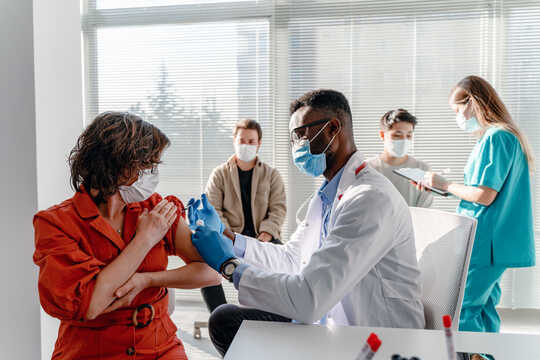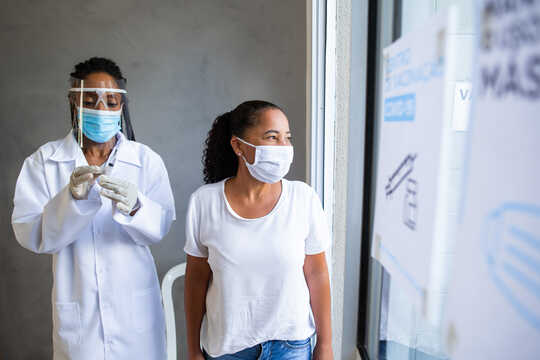 Vaccination has saved millions of lives throughout the course of history. Phynart Studio/E+ from Getty Images
Vaccination has saved millions of lives throughout the course of history. Phynart Studio/E+ from Getty Images
A federal judge has dismissed a lawsuit filed by employees at a Houston hospital who did not want to be vaccinated for COVID-19, claiming that COVID-19 vaccines are unsafe. In the June 12, 2021 ruling, U.S. district Judge Lynn Hughes rejected the lead plaintiff’s claim that the vaccines are experimental and dangerous.
This case is indicative of how many people believe that the COVID-19 vaccine could either kill or harm them in some way. But as scientists in public health, infectious diseases and vaccine development, we know that these claims are not just false – they are lethal. In the U.S. today, the vast majority of hospitalizations and deaths from COVID-19 occur among the unvaccinated.
Over the course of history, vaccines have allowed humanity to successfully combat viral diseases – some to the point of eradication. Here, we break down the role that vaccination plays in the fight against infectious disease, illustrate how the benefits far outweigh the risks and explain why everyone should be eager to be vaccinated against COVID-19.
 Vaccination is effective only if we all play our part. andreswd/E+ at Getty Images
Vaccination is effective only if we all play our part. andreswd/E+ at Getty Images
Get The Latest By Email
Revving up the immune system
Vaccines are one of the most innovative public health interventions in medical history. They activate the most effective human weapon against viruses that exists – our own immune system.
Vaccines show the immune system what the virus looks like so our bodies can manufacture specific antibodies to that virus. These antibodies then bind to and inactivate or destroy invading viruses.
In addition to antibodies, the immune system also generates immune-active lymphocytes programmed to specifically seek out, bind to and destroy invading viruses. Together, these antibodies and immune-active lymphocytes help the immune system quickly recognize viruses and often wipe them out before the host knows they’ve been exposed. The immune response may also reduce the consequences of infection to little more than minor symptoms.
The latest weapon against viruses: mRNA vaccines
mRNA vaccines contain only the genetic code for the spike proteins the COVID-19 virus uses to attach to cells, not the virus itself. This code primes the immune system to recognize the spike protein and manufacture antibodies against it. When the actual COVID-19 virus arrives, the immune system is then prepared to make antibodies against the invaders’ spike protein and thwart its entrance into cells.
This technology is new only in the sense that it had not yet been deployed when COVID-19 emerged. Tests of mRNA technology have been ongoing since the early 1990s.
mRNA technology gives the body instructions for how to protect itself from viruses.
It took under a year to develop an mRNA vaccine against COVID-19. This was not because the process was rushed, but because coronaviruses had already been studied in detail for previous outbreaks. Scientists knew in advance how to block coronaviruses from infecting cells.
The short-term reactions most people experience when receiving the Pfizer and Moderna vaccines, like muscle soreness and fatigue, are from the body revving up its immune system to attack the protein it was just instructed to manufacture. This reaction is a good sign – it means that your immune system is working. Keep in mind that none of the vaccines in use today can cause the disease they were designed to prevent.
Adverse effects of vaccines
That said, viral vaccines are not risk-free. Because humanity is so diverse, there will always be a tiny fraction of the population that reacts poorly to one or more of the vaccine’s ingredients. But these same risks also apply to common, frequently used medications, such as aspirin or insulin, that can’t be used safely by everyone. People continue to use these medications because the benefits far outweigh the risks.
There have been reports suggesting that deaths that occurred shortly after vaccine administration were due to the vaccine. But there has not been any confirmed causal link between these deaths and the COVID-19 vaccine. It’s likely that the great majority of these deaths are coincidental. For example, about 7,800 deaths unrelated to COVID-19 vaccines occur every day in the U.S. If the entire population was vaccinated at the same time, it might be tempting to think that the approximately 7,800 deaths that occurred that day were caused by the vaccine. But this would not be true.
People should also remember that early vaccination efforts prioritized elderly, often debilitated people in long-term care facilities. Given their advanced age and frailty, it is not surprising that a certain number died of natural causes or other diseases common to older adults during the post-vaccination period. This doesn’t mean that the vaccine caused these deaths.
Humanity’s collective responsibility to combat COVID-19
Vaccines are among the safest interventions against viral disease – and they operate not by introducing synthetic drugs into our bodies, but by activating and training our own immune systems to recognize and destroy viral invaders.
If viral transmission pathways are blocked to a high enough level to reach herd immunity, the disease caused by the virus – and sometimes the virus itself – can diminish or disappear. For example, smallpox was eradicated in 1980 due to a coordinated global vaccination effort. But not before it killed 300-500 million people in the 20th century alone.
Vaccination helped eradicate smallpox worldwide.
For viral vaccines to be fully effective, it’s not enough for only a few people to be vaccinated. Those who choose not to participate in vaccination efforts don’t just place themselves at risk of disability and death. They can also serve as reservoirs for viruses to remain active and mutate to potentially become more lethal for everyone – including those already vaccinated. COVID-19 strains have already emerged that have greater transmissibility, enhanced virulence and varying ability to evade vaccine-induced immunity.
The fact that a new weapon has been developed and deployed to combat COVID-19 means that humanity’s battle against all viral diseases can and should be renewed with increasing vigor. Choosing not to use these vaccines would be a tragic negation of our collective responsibility and squanders one of humanity’s most important public health discoveries. Winning the battle against COVID-19 and other viruses – and the disease, disability and death they cause – requires all of us to play our part.
About The Author
books_health







